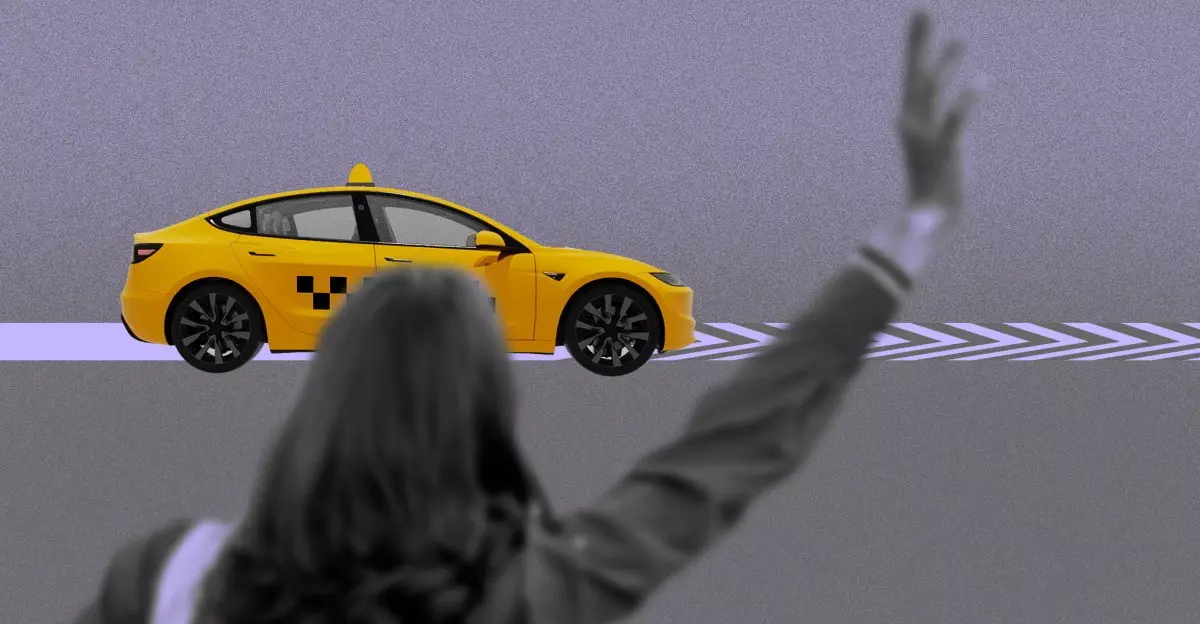The recent robotaxi launch in Austin, Texas, highlighted a troubling trend in the intersection of journalism, social media, and corporate communication. Tesla, a company long celebrated for its groundbreaking advancements in electric vehicles and autonomous technology, has transitioned from being a darling of the press to a master of media manipulation. This shift was starkly evident during the launch event, which was tightly managed and dominated by a handful of influencers. Traditional journalists were effectively excluded and faced ridicule for their attempts to probe deeper into the rollout’s implications. The atmosphere was reminiscent of a promotional film rather than an informative unveiling—an illustration of a controlled narrative aimed solely at bolstering Tesla’s image.
The phenomenon isn’t limited to the event itself. The attendees — primarily Tesla influencers and Musk superfans — have formed a clique that not only celebrates the brand but actively drowns out dissenting voices. When reputable media outlets attempted to engage, they were met with mockery from these influencers, emboldened by years of rhetoric from CEO Elon Musk that disparages traditional media. This reaction epitomizes Musk’s strategy of positioning his supporters against what he perceives as a biased and hostile press, creating an insular ecosystem that functions more like a fan club than an open forum for discussion.
Social Media Echo Chambers
Amplifying the issue is the rise of social media as a primary information source. Platforms like X (formerly Twitter) and YouTube have become fertile grounds for Tesla’s “alternative media” to thrive, where critical voices are drowned out in a sea of affirmations. Influencers, such as those with large followings, now wield considerable power in shaping public opinion, often at the expense of transparency. The phrase “we are the media now” has gained traction, suggesting a dangerous substitution of traditional journalism with self-appointed proponents, blurring the lines between a credible information source and a mere promotional entity.
This blurring has consequences. Joan Donovan, a professor with expertise in media and corporate influence, argues that the recent robotaxi rollout is a classic textbook case of “corporate propaganda.” The echo chamber effect has resulted in an environment where questions are stifled, and dissenting viewpoints marginalized—ultimately detracting from a thorough discourse on what Tesla’s technology means for the future of transportation. Such dynamics create a one-sided narrative that can only stoke skepticism about the company’s long-term viability and credibility.
From Tech Innovators to Corporate Defenders
Critics of Tesla often express frustrations that go beyond mere skepticism. Notable figures like Ed Niedermeyer have pointed out that the once-innovative aura surrounding Tesla is fading, especially as it faces increased scrutiny over its ability to deliver on ambitious promises. The lack of transparency during the robotaxi launch also reveals the dangerous consequences of promoting a narrative populated by influencers who act like a “Greek chorus” supporting the company while ignoring dissent.
Furthermore, this positioning has paradoxically distorted public perception. The fervor around Tesla’s technology often overshadows legitimate concerns regarding safety, ethics, and operational reliability. As influencers propagate their agendas, dismissing legitimate criticism, they inadvertently reinforce a narrative that glosses over substantive issues. Many within the Tesla community reap rewards for their loyalty, including perks tied to referral programs, which encourages a conflict of interest that further complicates independent evaluation of the brand’s developments.
The Need for Openness
The long-term sustainability of Tesla hinges on its ability to innovate and adapt in a transparent manner rather than clinging to a closed-loop of approval from its most loyal supporters. If Elon Musk aims to realize his vision of millions of autonomous Teslas navigating urban landscapes, it is imperative that Tesla begins to engage with broader audiences that include skeptics and critics. This requires opening the doors to more scrutiny and conversations that aren’t filtered through the lens of enthusiastic fanatics.
Openness presents its risks—most notably the potential unearthing of failures or shortcomings—but it’s essential for fostering lasting trust and credibility in a company that has so far thrived on hype. Real progress in autonomous technology cannot exist within an echo chamber but rather demands a comprehensive takes from all angles, including those who challenge Tesla’s assertions and efficacy. As the public grows increasingly aware of these media dynamics, the stark contrast between hype and reality will ultimately shape both Tesla’s narrative and its societal impact.

